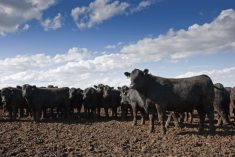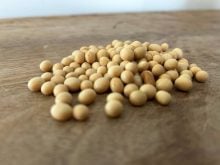For the week ending April 12, Western Canadian feeder cattle markets traded stead to as much as $10 higher compared to seven days earlier. The market has fully recovered from U.S. tariff uncertainty. Strength in the fed cattle market and healthy feeding margins continue drive replacement prices upward.
Alberta packers were buying fed cattle in the range of $470-$475/cwt. Using a 60 per cent grading, this equates to a live price of $282-$282/cwt. In Ontario processors were showing bids from $480/cwt to $485/cwt. Break-even pen closeouts in Alberta are in the range of $255-$265/cwt fob feedlot while profitability starts in Ontario at $253/cwt.
Read Also

U.S. grains: CBOT soybeans, corn, wheat fall in USDA data aftermath
Chicago grains took a dive on Friday, following a closely watched U.S. government crop report and the release of export data that could provide clues into Chinese buying.
There appears to be pent up demand for feeder cattle after feedlot operators delayed purchases of replacements prior to the April 2 tariff announcement. Ontario demand appeared to be quieter this week.
North of Saskatoon, backgrounded Angus cross steers on light barley, pellet and silage ration with full processing data scaled at 1,000 pounds were valued at $365/cwt fob feedlot. At the Ponoka sale, Limousin steers on backgrounding barley ration with full processing records averaging 984 pounds sold for $360/cwt in the ring. South of Calgary, Charolais medium flesh backgrounded heifers set at 850 pounds traded for $358 fob feedlot.
In central Alberta, a smaller package of medium frame, mixed steers averaging just over 800 pounds supposedly traded for $810. The Ste Rose Auction Mart in Manitoba had package of Charolais heifers with mean weight of 825 pounds valued at $381.
In the Calgary region, medium to larger frame black steers carrying lighter butter weighing just over 700 pounds sold for $465. In the same region, red mixed heifers with medium to lower flesh on the card at 715 pounds were valued at $410. The Dawson Creek Auction report had a small package of black steer calves weighing 668 pounds notching the board at $463 and a handful of black heifer calves with a mean weight of 688 pounds selling for $392.
Calves weighing under 625 pounds were quite variable across the prairies with singles and groups under five head trading at a discount to average values. The St Rose Auction Market Report had a smaller package of Charolais heifers weighing just over 601 pounds marked at $498. At the same sale, Charolais steers weighing 591 pounds traded for $529. In central Alberta, a smaller group of Angus cross heifers weighing 642 pounds were quoted at $440 and Simmental based steers with a mean weight of 635 pounds were valued at $505.
In central Alberta, Charolais steers averaging 500 pounds were last bid at $580 and in central Saskatchewan, British based steers on the card at 502 pounds were quoted at $558. The Westlock market report had a pair of black steers weighing 356 pounds moving through the ring at $610.
U.S. feeder cattle prices were slightly softer this past week trading $2 to $4 lower compared to the previous week. Live cattle prices in Kansas and Texas were quoted at US$204/cwt, down US$4/cwt from seven days earlier. U.S. markets were softer but Canadian prices were firm. This may be a red flag that the market is turning.















